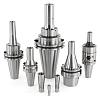- FMA
- The Fabricator
- FABTECH
- Canadian Metalworking
GEAR seeks action from industry, federal government
- December 20, 2016
- News Release
- Metalworking
The Group of Experts in Automation and Robotics (GEAR), an initiative of Canadian Manufacturers & Exporters (CME), has called on both industry and the federal government to take action to help Canadian manufacturers improve their productivity through the adoption of automation.
CME and the GEAR network recently released “Industrie 2030: Manufacturing Growth, Innovation and Prosperity for Canada,” a plan to double Canadian manufacturing output by 2030.
“Automation is the key to achieving the goals of doubling output by 2030 in Canada,” said Martin Lavoie, executive director of GEAR Canada. “This is certainly not simple. However, with industry and governments working together and adopting a plan of action designed to help manufacturers invest in automation to increase their productivity, it can be done."
In the next months, GEAR will host technology demonstration workshops and related events throughout Ontario to help raise awareness of the advantages in adopting automation.
Partnering with Canadian manufacturers such as Festo and ABB, other industrial associations such as Québec's Réseau des Équipementiers en Automatisation Industrielle (REAI), and academic institutions such as Sheridan College, GEAR will share best practices and inform about automation practices that can help companies improve their productivity and operational efficiency.
“Sheridan College is proud to partner with GEAR on this important initiative,” said Farzad Rayegani, associate dean in the School of Mechanical and Electrical Engineering Technology and director of the Centre for Advanced Manufacturing and Design Technologies. “Our centre is one of the best-equipped research and training facilities in the country, and we are actively working with SMEs that are seeking to explore and adapt new technologies. We look forward to collaborating with GEAR to help promote the benefits of automation more broadly.”
As manufacturing moves from mass production to mass customization, the flexibility to efficiently change and adapt production becomes critical. This requires increased collaboration between people and robots, between islands of automation, and even between production sites. Collaboration and digitization are hallmarks of the factory of the future, where actionable information drives better decisions and operations, from engineering and commissioning to running and maintaining production.
“The future of manufacturing in Canada relies on collaboration and digitization, allowing industries flexibility to adapt and change to market conditions,” said Nathalie Pilon, president of ABB in Canada.
subscribe now


Keep up to date with the latest news, events, and technology for all things metal from our pair of monthly magazines written specifically for Canadian manufacturers!
Start Your Free Subscription- Industry Events
MME Winnipeg
- April 30, 2024
- Winnipeg, ON Canada
CTMA Economic Uncertainty: Helping You Navigate Windsor Seminar
- April 30, 2024
- Windsor, ON Canada
CTMA Economic Uncertainty: Helping You Navigate Kitchener Seminar
- May 2, 2024
- Kitchener, ON Canada
Automate 2024
- May 6 - 9, 2024
- Chicago, IL
ANCA Open House
- May 7 - 8, 2024
- Wixom, MI



















